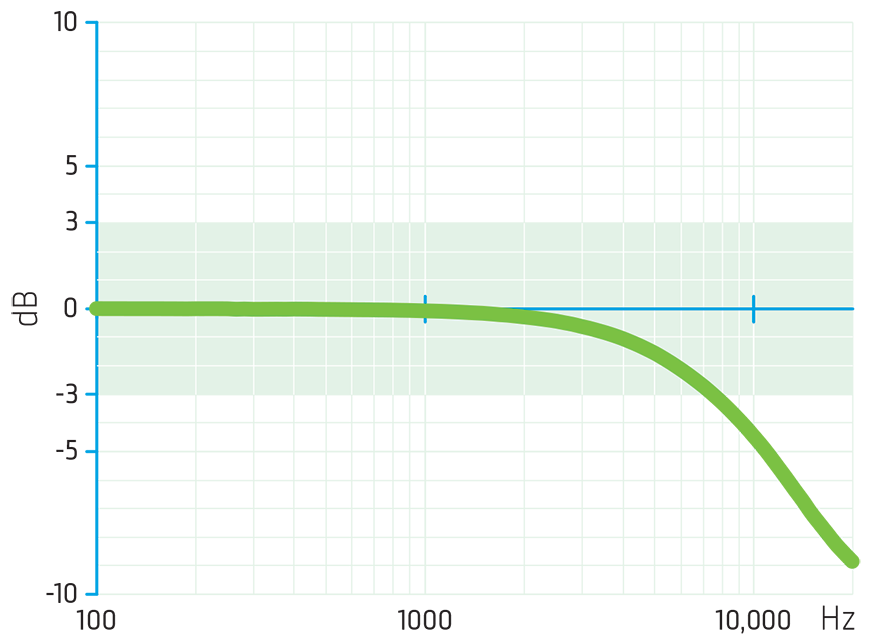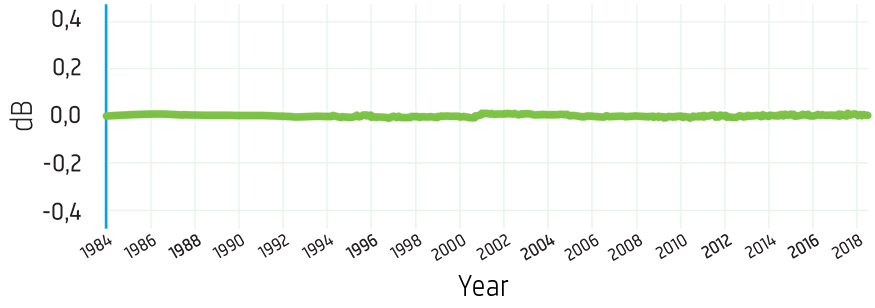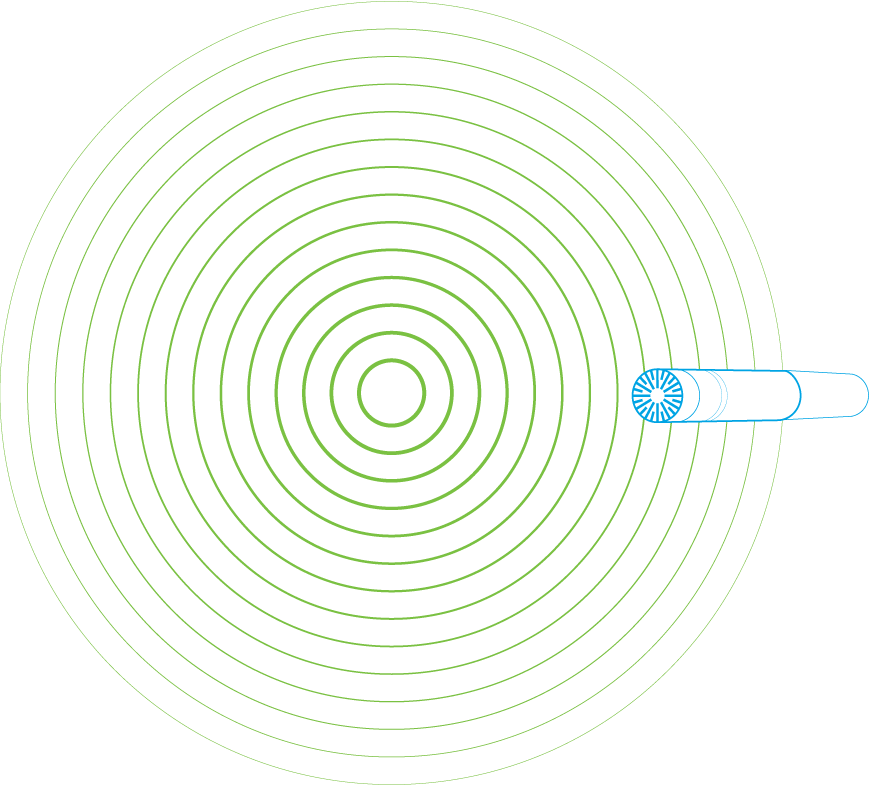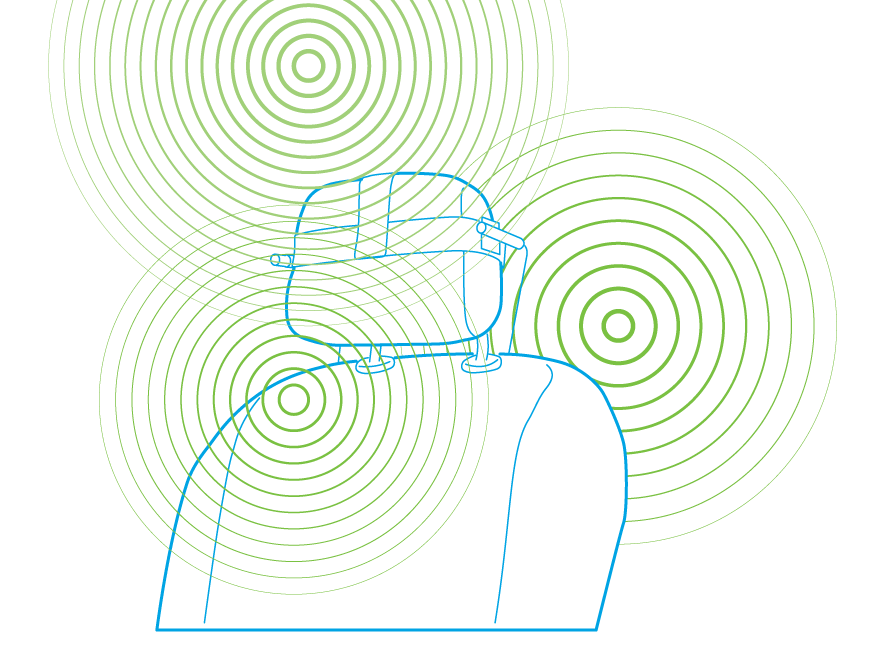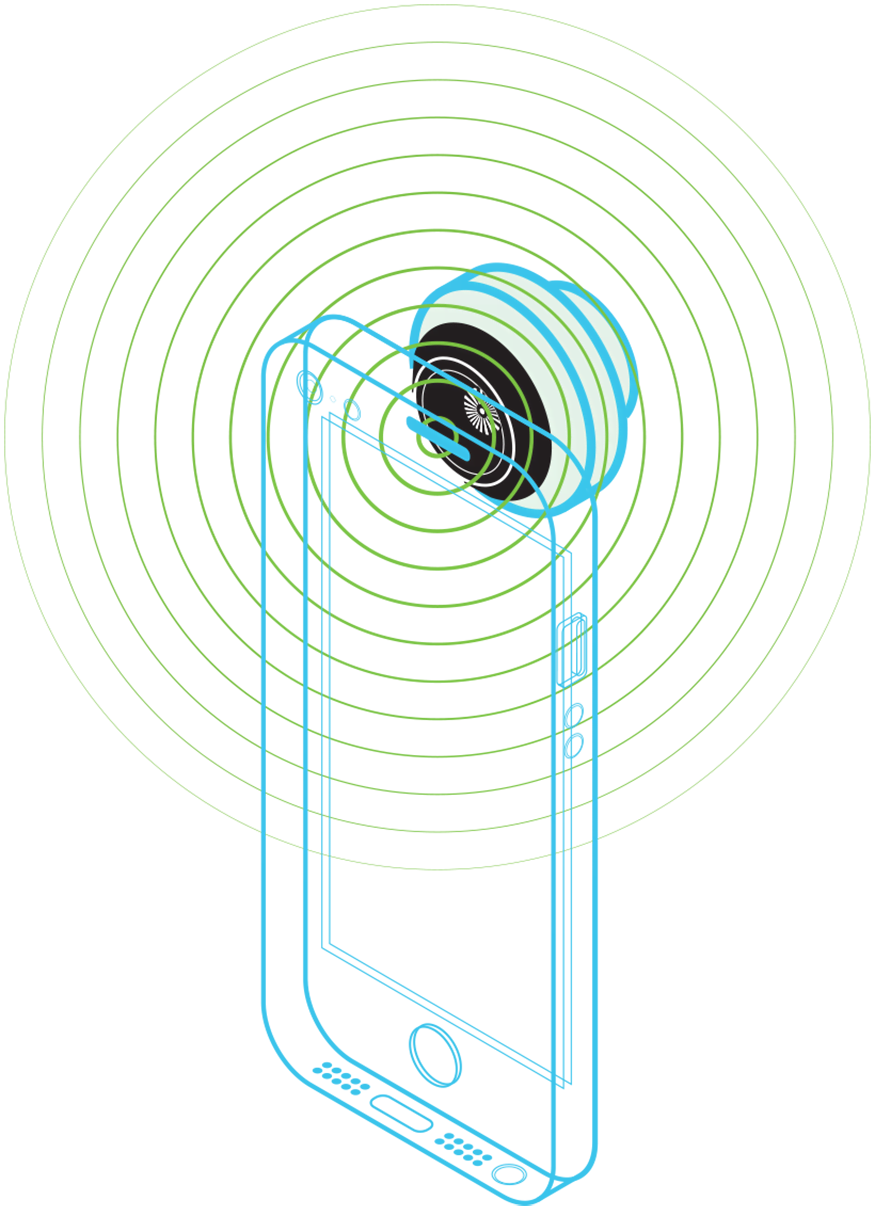LEARN MORE
MEASUREMENT MICROPHONES
Brüel & Kjær has developed and produced high-end measurement microphones since 1945. We have uninterruptedly worked on research and development and on calibration methodology to ensure continuous improvements in microphone accuracy and performance.
Today, this approach contributes to a wide portfolio of measurement microphones covering all kinds of applications from acoustic seismic detection systems to airbag measurement and ultrasonic applications.
Microphone Physics
Measurement microphones are based on a very simple physical principle: Capacitance.
The capacity of a microphone is inversely proportional to the distance between the backplate (a stiff plate), and the diaphragm (a thin, highly tensioned metal foil). When exposed to sound pressure, the diaphragm deforms and moves closer to or further away from the backplate, changing the capacity of the system. These variations in capacitance are converted to voltage variation. Most measurement microphones are based on this principle.
Microphone Diaphragm
Measurement microphones come in diameters of 1-, ½-, ¼- and 1/8 inch. The bigger the diaphragm, the less stiff it is and better to detect smaller sound pressure variations. On the other hand, the size of the diaphragm limits detecting frequencies with wavelengths that are in the same range or bigger than the diaphragm.
DID YOU KNOW?
Large diaphragms give lower noise, while small diaphragms allow high frequency. Small-sized microphones allow better omnidirectional characteristics at high frequencies.
The displacement of the diaphragm for a typical ½-inch microphone is only in the magnitude order of 5 nanometres for excitation of one pascal. For comparison, a diaphragm with a diameter the size of planet earth would barely move 5 meters

DID YOU KNOW
Using a free-field microphone in a pressure-field environment gives an error close to 9 dB around 20 kHz.
Microphone frequency response chart.
Microphone Sensitivity
The sensitivity is the voltage produced by microphones under defined sound pressure. It is defined in V/Pa and is frequency dependent. The sound pressure of one pascal corresponds to a level of 94 dB SPL. That is why most microphone calibrators (for example our Sound Calibrator Type 4231) produce 94 dB SPL or 1 Pa.
Because sensitivity is frequency-dependent, the frequency response is defined as an expression of the sensitivity in the entire frequency range. This is generally expressed in decibels relative to the 250 Hz sensitivity.
DID YOU KNOW
We have been carefully monitoring the sensitivity of our Laboratory Standard Microphone Type 4160 and Type 4180 since 1984. The sensitivity stays within a ±0.02 dB range (this means less than 0.2% changes). These two microphones are used in calibration systems all over the world.
Microphone sensitivity chart showing the sensitivity of Type 4160 and Type 4180 laboratory standard microphones from 1984 to 2018.
Microphone Dynamic Range
The dynamic range of measurement microphones (for example, 16 dBA - 143 dB) is the range where the microphone acts as a perfect linear transducer.
The first number is the inherent noise. Both condenser microphones and pre-amplifiers have an inherent noise caused, among other things, by limitations in the electronics and Brownian movements.
This number indicates the sound pressure level that would create the same voltage as the noise generated by the microphone itself. The noise is measured in the third-octave band, A-weighted in the human hearing range (between the 22.4 Hz and 22.4 kHz band), if nothing else is specified. The second number is the highest sound pressure level measurable with less than 3% total harmonic distortion.
DID YOU KNOW?The dynamic range of a microphone is often limited by the microphone preamplifier.
For example, a CCLD (constant-current line drive) preamplifier is designed to deliver a maximum of 7 V peak for frequencies lower than 20 kHz. This gives a maximum of 134 dB SPL for a microphone sensitivity of 50 mV/Pa. It is possible in this case to extend the upper limit of the dynamic range to 146 dB by using a classical preamplifier.
LEARN MORE
MICROPHONE
PREAMPLIFIERS
DID YOU KNOW
Brüel & Kjær ½-inch Free-field Microphone Type 4191 by has a dynamic range of 20 dBA to 162 dB (this is 142 dB).
If we convert this ratio to distance, the measurement would stretch from a strand of hair to more than three Eiffel Towers stacked on top of each other.
Microphone Sound Field
Measurement microphones, by their size and shape, influence the sound pressure. This influence, which depends on the type of sound field, is considered in each microphone’s design and the microphone responses are optimized to compensate for the influence. This allows us to always give a flat response to the chosen sound field.
Measurement microphones are divided into three main types, each type optimized for one of the three main types of sounds field, and it is important to choose the microphone that is best suited for the sound field.
Free-field
Free-field microphones are typically used to measure loudspeakers or outdoor sound.
In order to make measurements in a free-field, totally without reflecting objects, the measurements must be made outdoors at the top of a flagpole (or equivalent) or in an anechoic chamber.
In an anechoic chamber the ceiling, floor and all the walls are covered by a highly absorptive material which eliminates reflections. Thus, the sound pressure level in any given direction from the noise source may be measured without the presence of interfering reflections.
Diffuse-field
The opposite of an anechoic chamber is the reverberation chamber where all surfaces are made as hard and reflective as possible and where no parallel surfaces exist. This causes a diffuse-field because all the sound waves are arriving simultaneously from all directions with equal probability and level.MICROPHONE TYPE 4191
Sound fields with a close resemblance to diffuse-field can be achieved in environments such as buildings with hard walls, where many simultaneous sound or noise sources exist, such as with in-cabin measurements and in churches.
If you are not sure about the sound field you are in, it is best to assume that it is diffuse to minimize measurement error. Diffuse-field microphones are typically used to measure vehicle interior noise or building acoustics.
Pressure-field
A pressure-field is sound pressure that has the same magnitude and phase at any position within the field. Sound fields with a close resemblance to the pressure field can be achieved in small cavities (small compared to the wavelength) such as artificial ears.
Pressure-field microphones are typically used in couplers, wind tunnels or in flush-mounted measurements.
Microphone Stability
Brüel & Kjær's measurement microphones are designed to be extremely stable, especially over time, temperature, humidity, and ambient pressure.
To achieve maximum stability, we use carefully selected, high-quality material; we apply controlled heat treatment to artificially age and release any tension in the cartridge and we continuously test each microphone at every step of the production process.
The microphones are exposed to multiple cleaning processes during fabrication in a class 10 cleanroom. In class 10 clean room, there are less than 10 particles larger than 0.5 µm and less than 2 particles between 1 and 5 µm per cubic foot. As a comparison, ordinary room air is approximate ‘class 1 million’.
Considering the distance between the backplate and the diaphragm being generally around 20 µm, any particles bigger than this that are present in the cavity would cause stability issues – especially when condensation or changes in temperature occur.
If the membrane is punctured, contamination will occur, and particles and residue will enter the cartridge. Achieving the same level of cleanliness during a repair may not guarantee a microphone with an optimal response. This is the reason why Brüel & Kjær does not offer microphone repair.

Suscríbase a nuestro boletín informativo y recibirá las últimas noticias de B&K sobre sonido y vibración



